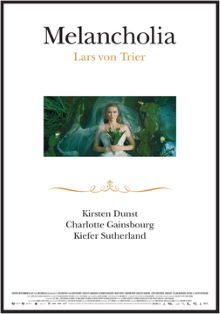
I haven’t been a big fan of director Lars von Trier, perhaps because I have yet to watch his earliest films that solidified his reputation. This one however I found absolutely mesmerizing and not just because it turns out to have a vaguely sci-fi theme. Of course that is not the point and the film has no pretensions about being scientifically accurate but it does make wonderful use of the imagery of stars and planets to illustrate its real object of exploration: individual reactions to the imminent end of the world.
Justine and her new husband Michael finally make it to their wedding reception after a long delay as their stretch limousine has difficulty navigating the narrow roads. It takes place on the lavish estate owned by the husband of Justine’s sister Claire. Despite their lateness and the increasing irritability of the guests, Justine is unhurried and takes her time. She keeps interrupting the proceedings, to wander outside on her own to stare at the sky, to take a bath, and so on and seems less and less enthusiastic about the wedding and more and more melancholic as the night drags on. While superficially sweet with Michael, she does not actually seem to be very close to him at all and only confides in her sister while the brother in law keeps complaining about the cost of the wedding. It is only after the whole event is over that we learn that a rogue planet named Melancholia is headed towards the Earth and there are fears that it may impact the world.
The film opens with vague hints of the imminent disaster, such as long shots of the incoming planet in space, so it’s not really a spoiler. But even if we don’t understand why this disaster of a wedding is happening at all, the feelings it evokes are exquisite. The refined opulence of the estate makes for an amazing setting as the audience is prompted to be increasingly embarrassed on Justine’s behalf as she makes everyone wait for her and wastes all of the expensive preparations. The presence of the other guests played by the star-studded cast makes everything so much more pointed, such as the playful yet empty affability of Justine’s father, played by John Hurt, and the vicious cynicism of her mother, played by Charlotte Rampling. Even without further context or explanation, the wedding scene is a superb play of emotions. Yet the film does have a reason for doing all that as apparently Justine is somehow able to have a premonition of the end of the world and so knows better than anyone else how meaningless all this is.
The second half of the film is profoundly different with only Justine, Claire and Claire’s husband and young son to await the imminent end of the world. Once again, it’s striking how von Trier determinedly sticks to his chosen focus. It’s hard to imagine another director being able to resist the temptation to show how the rest of the world is responding to the crisis. Yet this insular focus gives the film tremendous expressive power as we watch how these three adults respond to differently. It’s a little trite and predictable perhaps how they show that the seemingly rationalist husband completely break down in the face of total annihilation yet the melancholic Justine seems to grow in grace as the end draws ever nearer but it does make for powerful cinema and isn’t an unreasonable portrayal of such personalities. At the same time, this is a very dark piece as Justine is able to find such solace only because she seems to feel that life is full of such pain that oblivion is preferable to existence. This gives the film a kind of poetic beauty but as a celebration of the instinct to commit suicide, this is not a good message to promulgate.
From what I understand, von Trier’s intention here was to make it clear from the very beginning that the end of the world is inevitable and there is no possible last moment reprieve. I’m not sure he quite succeeds here as he seems to tease the possibility of survival just a tad too much. In any case, I do agree as an artistic work this is a great success, exploring emotions and situations that are not often experienced in other works. Science-fiction stories do sometimes explore this type of scenario but it’s difficult to think of one that is as determinedly fatalistic as this one. A classic of the genre would be Larry Niven’s 1971 short story Inconstant Moon which actually ends on a hopeful note.